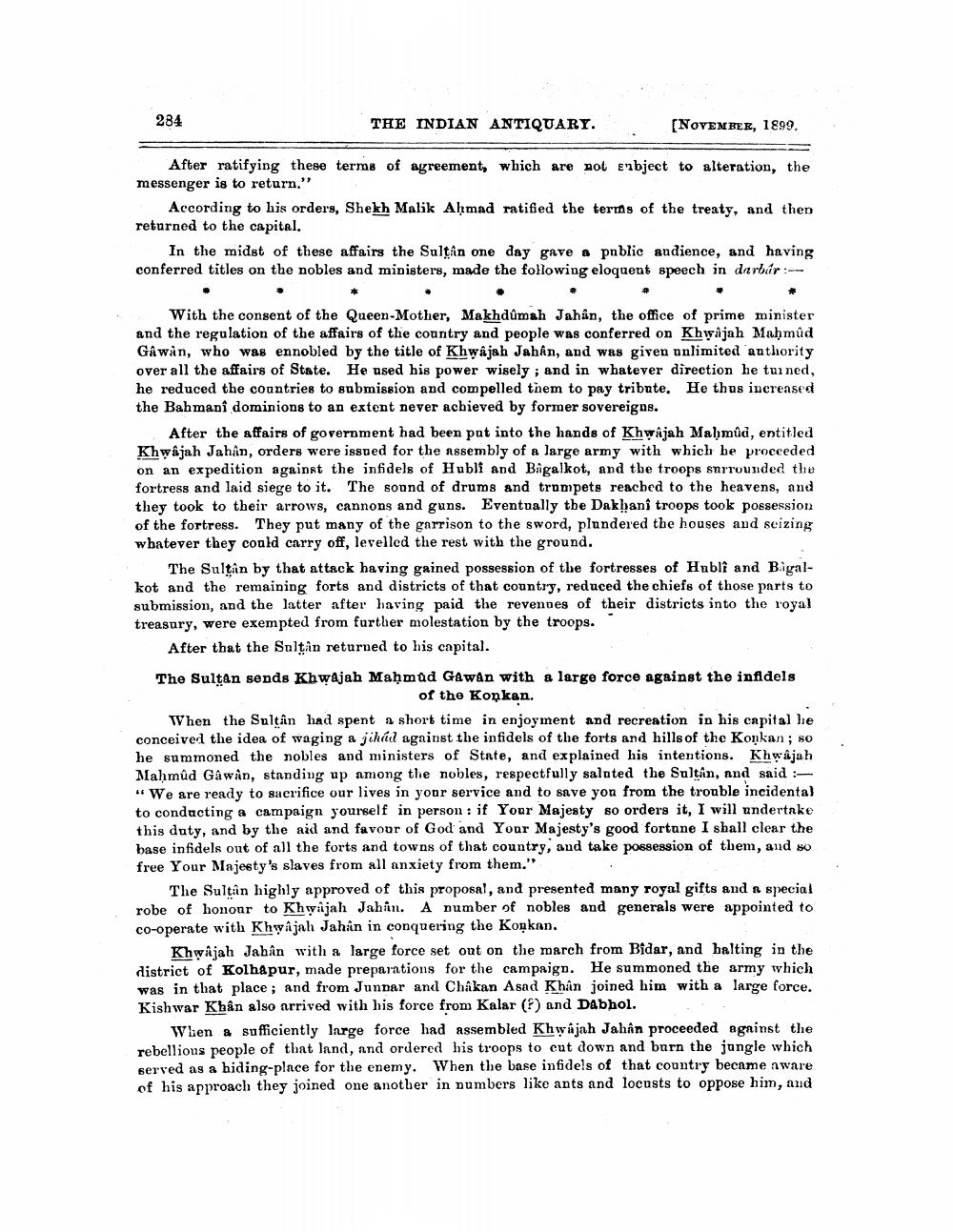________________
284
THE INDIAN ANTIQUARY..
[NOVEMBER, 1899.
After ratifying these terms of agreement, which are not subject to alteration, the messenger is to return."
According to his orders, Shekh Malik Ahmad ratified the terms of the treaty, and then returned to the capital.
In the midst of these affairs the Sultan one day gave a public audience, and having conferred titles on the nobles and ministers, made the following eloquent speech in darbír :
With the consent of the Queen-Mother, Makhdûmah Jahân, the office of prime minister and the regulation of the affairs of the country and people was conferred on Khwajah Mahmud GAwan, who was ennobled by the title of Khwajah Jahan, and was given unlimited authority over all the affairs of State. He used his power wisely; and in whatever direction he turned, he reduced the countries to submission and compelled them to pay tribute. He thus increased the Bahmanî dominions to an extent never achieved by former sovereigns.
After the affairs of government had been put into the hands of Khwajah Mahmûd, entitled Khwajah Jahận, orders were issued for the assembly of a large army with which he proceeded on an expedition against the infidels of Hubli and Bigalkot, and the troops snrrounded the fortress and laid siege to it. The sound of drums and trampets reached to the heavens, and they took to their arrows, cannons and guns. Eventually the Dakhani troops took possession of the fortress. They put many of the garrison to the sword, plundered the houses and seizing whatever they could carry off, levelled the rest with the ground.
The Sultan by that attack having gained possession of the fortresses of Hubli and Bigalkot and the remaining forts and districts of that country, reduced the chiefs of those parts to submission, and the latter after having paid the revenues of their districts into the royal treasury, were exempted from further molestation by the troops.
After that the Sultan returned to his capital. The Sultan sends Khwajah Mahmud Gawan with a large force against the infidels
of the Konkan. When the Sultan had spent a short time in enjoyment and recreation in his capital he conceived the idea of waging a jihaill against the infidels of the forts and hills of the Konkan; so he summoned the nobles and ministers of State, and explained his intentions. Khwajah Mahmúd Gâwân, standing up among the nobles, respectfully salnted the Sultan, and said :"We are ready to sacrifice our lives in your service and to save yon from the trouble incidental to conducting a campaign yourself in person : if Your Majesty so orders it, I will undertake this duty, and by the aid and favour of God and Your Majesty's good fortune I shall clear the base infidels out of all the forts and towns of that country, and take possession of them, and so free Your Majesty's slaves from all anxiety from them."
The Sultan highly approved of this proposal, and presented many royal gifts and a special robe of honour to Khwajah Jahan. A number of nobles and generals were appointed to co-operate with Khwajah Jahin in conquering the Konkan.
Khwajah Jahan with a large force set out on the march from Bidar, and halting in the district of Kolhapur, made preparations for the campaign. He summoned the army which was in that place; and from Junnar and Châkan Asad Khan joined him with a large force. Kishwar Khân also arrived with his force from Kalar (?) and Dabhol.
Wlien a sufficiently large force had assembled Khwajah Jahan proceeded against the rebellious people of that land, and ordered his troops to cut down and burn the jungle which served as a hiding-place for the enemy. When the base infidels of that country became aware of his approach they joined one another in numbers like ants and locusts to oppose him, and




